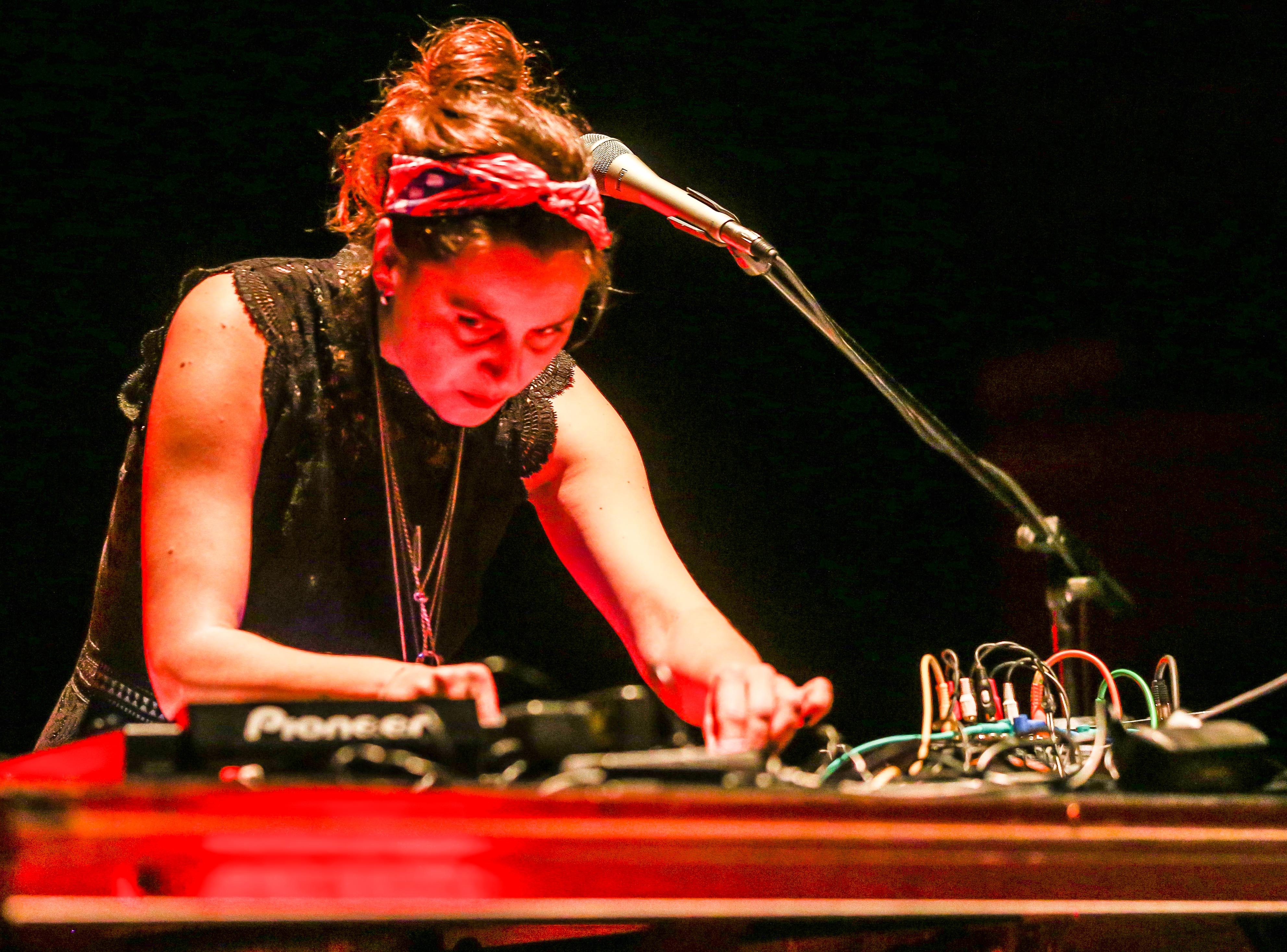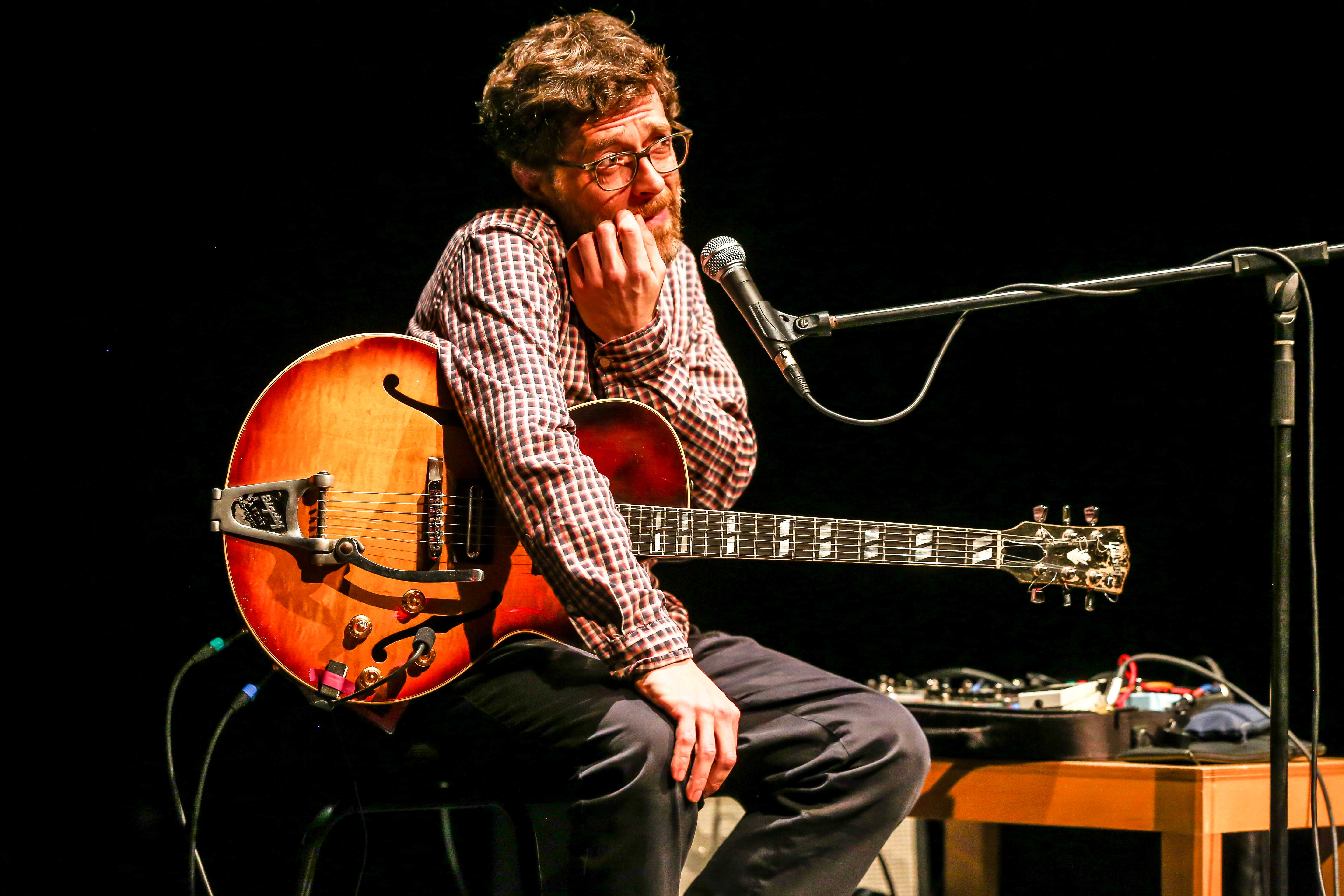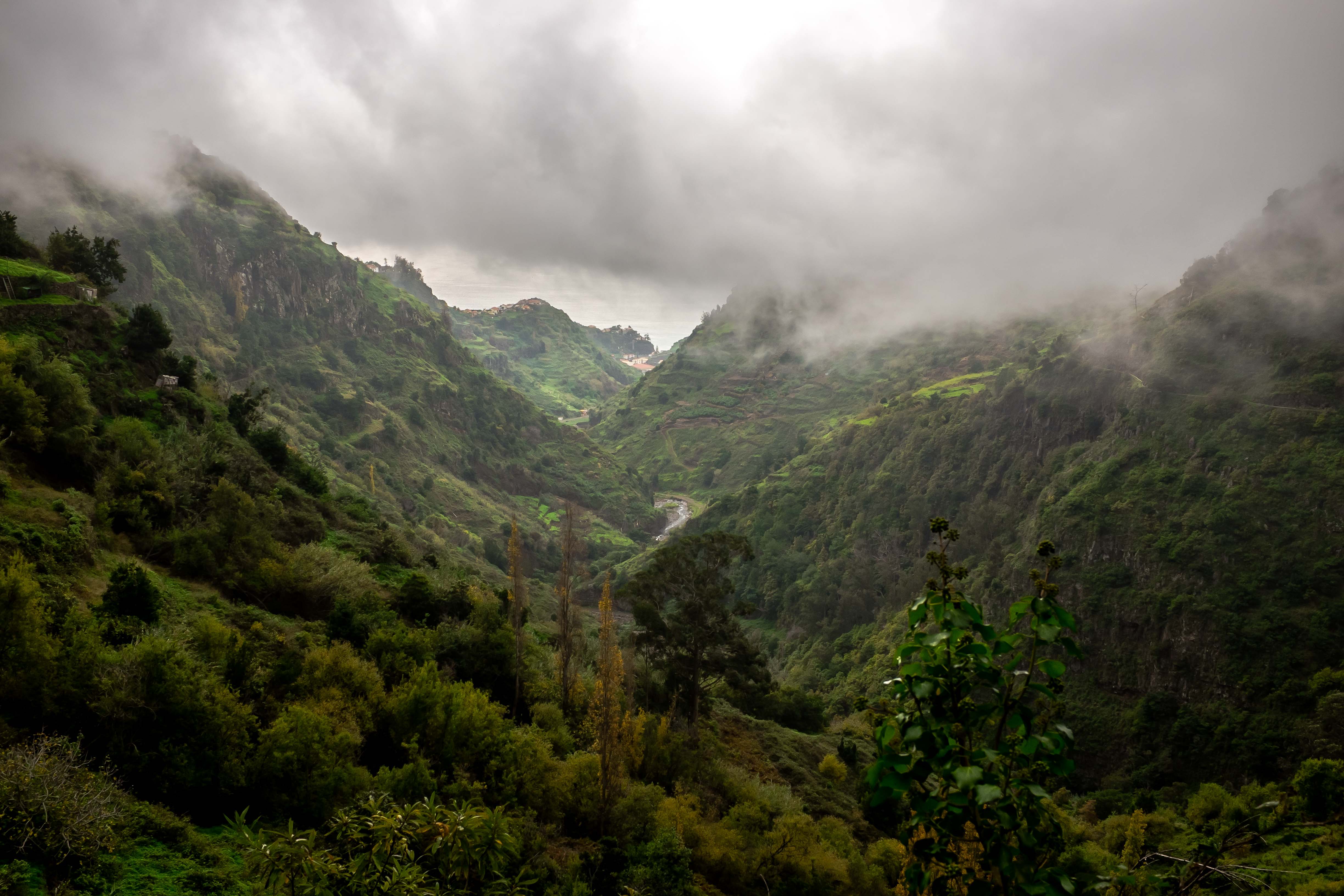MOST READ
- interview with xiexie オルタナティヴ・ロック・バンド、xiexie(シエシエ)が実現する夢物語
- Chip Wickham ──UKジャズ・シーンを支えるひとり、チップ・ウィッカムの日本独自企画盤が登場
- Natalie Beridze - Of Which One Knows | ナタリー・ベリツェ
- 『アンビエントへ、レアグルーヴからの回答』
- interview with Martin Terefe (London Brew) 『ビッチェズ・ブリュー』50周年を祝福するセッション | シャバカ・ハッチングス、ヌバイア・ガルシアら12名による白熱の再解釈
- VINYL GOES AROUND PRESSING ──国内4か所目となるアナログ・レコード・プレス工場が本格稼働、受注・生産を開始
- Loula Yorke - speak, thou vast and venerable head / Loula Yorke - Volta | ルーラ・ヨーク
- interview with Chip Wickham いかにも英国的なモダン・ジャズの労作 | サックス/フルート奏者チップ・ウィッカム、インタヴュー
- interview with salute ハウス・ミュージックはどんどん大きくなる | サルート、インタヴュー
- Kim Gordon and YoshimiO Duo ──キム・ゴードンとYoshimiOによるデュオ・ライヴが実現、山本精一も出演
- Actress - Statik | アクトレス
- Cornelius 30th Anniversary Set - @東京ガーデンシアター
- 小山田米呂
- R.I.P. Damo Suzuki 追悼:ダモ鈴木
- Black Decelerant - Reflections Vol 2: Black Decelerant | ブラック・ディセレラント
- Columns ♯7:雨降りだから(プリンスと)Pファンクでも勉強しよう
- Columns 6月のジャズ Jazz in June 2024
- Terry Riley ——テリー・ライリーの名作「In C」、誕生60年を迎え15年ぶりに演奏
- Mighty Ryeders ──レアグルーヴ史に名高いマイティ・ライダース、オリジナル7インチの発売を記念したTシャツが登場
- Adrian Sherwood presents Dub Sessions 2024 いつまでも見れると思うな、御大ホレス・アンディと偉大なるクリエイション・レベル、エイドリアン・シャーウッドが集結するダブの最強ナイト
Home > Reviews > Live Reviews > マデイラディグ実験音楽フェスティヴァル- Madeiradig experimental music fe…

マデイラディグ実験音楽フェスティヴァル
Madeiradig experimental music festival
2018年11月30日〜12月3日
文:イアン・F・マーティン訳:五井健太郎 photos : Roland Owsnitzki Feb 02,2019 UP
「あんなに楽しいフェスは経験したことがなかった。だからフェスが嫌いなひとのために、自分でもやってみようと思ったんだ」
ポルトガルのマデイラ島で開催されている、マデイラディグ実験音楽フェスティヴァルのオーガナイズ・リーダーであるマイケル・ローゼンは、大西洋を見晴らす崖に面したホテルのバーのバルコニーに座っている。雨と汗と泥にまみれた、よくあるフェスの体験からは数百マイルも隔たった雰囲気がそこにはある。というかその雰囲気は、ほかのどんな場所にも似ていないものだ。
フェスの来場者の大半が滞在する小さな町ポンタ・ド・ソルは、高く深い谷の上に位置している。フェスの運営を取り仕切るメインとなる中継地点であるホテル、エスタラージェン・ダ・ポンタ・ド・ソルはとくに素晴らしく、まるで崖沿いを切りだしたようにして作られていて、海に沿った通りからはただ、崖の岩肌を上に向かってホテルへと至る、すっきりとした作りのコンクリート製のエレヴェーターだけが見えている。
エスタラージェンでのアフター・パーティーや毎晩行われるライヴはあるが、フェスのメインとなるプログラムは、ホテルから車ですこし移動したところにあるアート・センターで行われる、午後の二つのショーのみである。
ローゼンは次のように述べている。「毎日たくさんのパフォーマンスが行われるフェスが好きじゃないんだ。テントを張って、雨が降って、人混みに囲まれてっていうやつがね。僕らが借りている会場のキャパは200人くらいで、それがちょうどホテルが受けいれられる上限でもあるから、そのくらいが集客の上限なんだよ」
フェスは金曜の夜、ポルトガルのサウンド・アーティスト、ルイ・P・アンドラーデ&アイレス[Rui P. Andrade & Aires]によるアンビエント・セットとともに開幕し、アナーキーで混沌としたフィンランドのデュオ、アムネジア・スキャナー[Amnesia Scanner]によるデス・ディスコがそれに続く。マデイラディグのプログラムはみな、多くの人が実験音楽と理解しているものの元にゆるやかに収まる音楽ばかりなわけだが、主催者側がはっきりと意図して普通とは異なったアプローチを見せているこの組みあわせ方によって、2組のアーティストのあいだにある違いが強調されることになっている。

アナ・ダ・シルヴァとフュー
日曜日の夜は、不気味さや打楽器のような調子や、美しさや激しさのあいだで移り変わっていく自らの演奏から生みだされるループによって音楽を構築する、ポーランドのチェリスト、レジーナ[Resina]の演奏とともに始まる。彼女の演奏は、つねに変化するアニメーションによるコラージュや、戦争の映像、自然や文明や、コミュニケーションやテクノロジーといったものの相互の関係を映しだすヴィデオの上映を背景して行われる。コミュニケーションというテーマは、より遊び心に満ちたものとして、ただ一つのテーブル・ランプに照らしだされた多くの電子機材を前に演奏される、アナ・ダ・シルヴァ[Ana da Silva]とフュー[Phew]による、めまぐるしい展開によって方向感覚を狂わせるようなライヴのなかでも取りあげられている。参加したアーティストのなかで、フェスの開催日に到着したフューはもっとも遠くからやってきている人物だが、その一方でダ・シルヴァは、生まれ育った島に戻ってくるかたちとなっている。2人のアーティストのあいだにあるこのコントラストは、それぞれの言語を使い、ひとつひとつの言葉にたいし、ユニークかつときに不協和音的な解釈を与えている彼女たちのパフォーマンスそのもののなかにも、はっきりとその姿を見せているものだ。演奏のある地点で彼女たちは、曲間のおしゃべりの一部分を取りあげてループさせ、それをパフォーマンスのなかに組みこむことで、ライヴのもつ遊び心に満ちた親密な性格を強調している。
ローゼンは、そうした彼女たちのライヴを生む根底にある自身の哲学を次のように説明している。「普通では一緒に見ることのないような二組のアーティストに同じ舞台に上がってもらうんだ。まったく異なっているように見えながら、だけど質の部分で繋がっているアーティストにね」
こうしたアプローチは、ドイツのクラブ「キエツザロン」[Kiezsalon]で彼がオーガナイズしているイヴェントにも見られるもので、マデイラディグについて理解するためには、多少ベルリンのことについて触れておく必要がある。というのも、ローゼン以外のオーガナイザーだけではなく、オーディエンスの大半もその街からやってきているからだ。
ローゼンはベルリンのシーンを退屈でバラバラなままの状態だと述べている。いわくそこには、すでに存在しているオーディエンスに媚びたありきたりなイヴェントばかりがあり、結果として、シーンやジャンルを分断する区別を強化することになっているのだという。オーストリアを拠点にしたスロバニアのミュージシャンであるマヤ・オソイニク[Maja Osojnik]もやはりこの点を繰りかえし、彼女が暮らしているウィーンも同じように、まれに土着的な「ヴィーナーリート」[Wienerlied]という民謡の一種がジャンルを横断した影響を見せているくらいで、パンクがあり実験的な音楽があるというかたちで、内部での音楽シーンの分断という状況にあると述べている。東京のインディーでアンダーグラウンドなシーンのなかに深くかかわっている人たちもきっと、すぐに同じような状況に思いあたることだろう。

マヤ・オソイニク
マヤ・オソイニクは、パリを拠点としたカナダのミュージシャンであるエリック・シュノー[Eric Chenaux]による、キャプテン・ビーフハートの経由したニック・ドレイクといった雰囲気のジャズ・フォークの後に続いて、金曜日の夜の最後に出演した。シュノーの演奏が、いったん心地よく美しく伝統的な音楽的発想を取りあげ、それをさまざまなかたちで逸脱させていくことによって特徴づけられるものであるのにたいし、オソイニクの音楽は、不協和音の生みだすことを恐れることなくさまざまな要素を重ねていき、そのすべてが、彼女がときに「ディストピア的な日記」と呼ぶ、音によるひとつの物語をかたちづくるものにしている。全体の雰囲気や演奏に通底する低音やパルス音は、催眠的でインダストリアルな高まりを見せ、オソイニクのヴォーカルは、豊かな抑揚をもった中世の歌曲からポストパンクの熱を帯びた怒りまで、自在に変化していくものとなっている。

エリック・シュノー
後に彼女と話したさいオソイニクは、同時代の音楽からの影響ももちろんあるが、古典的な音楽教育を受けてきのだという事実を明かしてくれた。一三〇〇年代にフランスのアヴィニオンに捕囚されていた教皇たちのためだけに作曲された、あまり知られていない音楽に興味があるのだと、興奮気味に彼女はいう。自身が受けてきた折衷的で渦を巻くような影響にかんして彼女は、次のように述べている。「いろんな音楽をアカデミックに学んでみた結果、そこには多くの並行性があることに気づいたんです。たしかに規則は違うし、アプローチも違う、根底にある美学も違っていますが、同じ鼓動が感じられるときがあるんです」
シュノーとオソイニクが共有しているのは、二組のライヴがともにどこかで、人間は複雑で、つねに仲良く議論しているわけではないのだという事実を感じさせるものだという点にある。したがってオーディエンスにたいするメッセージは、オソイニクがいうとおり、「目を覚ますこと。受けとるだけでいるのをやめて、探すことをはじめること」にあるのだといえる。
マデイラディグは、多くの点で伝統的な音楽フェスと異なるものとなっているわけだが、一方でそれは、参加する者たちのなかに普通とは異なる現実を創造するというその一点において、真の意味で伝統的なフェスティヴァルといえるものとなっている。フェスの初日の時点では、どこか気後れしたような初参加者と毎年参加しているヴェテランのあいだに目に見えるはっきりとした違いがあったが、フェスのオーガナイズの仕方によって、そこにはすぐに、その場にいる人間たちによる共同体の感覚が育まれることとなっていた。イベントの後の食事やエスタラージェン・ダ・ポンタ・ド・ソルでのアフター・パーティーは、交流の機会となり、毎回あるメイン会場への車での移動が、参加者をひとつにすることを促している。日中に辺りの自然のなかや最寄りの大きな町であるファンシャルへ旅することは二重の意味をもっていて、参加者がひとつのグループとして絆を深める機会となっていると同時に、イヴェントの会場でもあるホテルの盛りあがりからの息抜きとしても機能している。

またマデイラ島は並外れて美しい島であると同時に、不思議なことにどこかで日本に似たところもある場所だといえる。通りに沿ってその島を旅していると、山がちな景色が必然的にトンネルのなかを多く通ることを強いてくるわけだが、気がつけばやがて古い通りに出て、島がその本当の姿を見せてくる。そこには雲を突きぬけ緑で覆われた、ぐっと力強く迫りだしている火山の多い地形があり、谷に沿って並ぶ家々や急な勾配に沿った畑があり、浅くコンクリートで舗装されれ、海まで続く川が見られる。海を見張らしながら、古い時代の商人たちが登った道のひとつを登っていたとき、ポルトガルの現地スタッフのひとりが、「この景色を見るためには、ここまで登ってこなきゃいけないんですよ」と述べていた。
美しさを見いだすためには努力が必要だというこの発想は、風景についてだけではなく、音楽についても当てはまるものだろう。フェスの最終日は、カナダのアーティストであるジェシカ・モス[Jessica Moss]による繊細で複雑なヴァイオリンの演奏とともに始まる。彼女はマデイラディグに参加する多くのアーティスト同様、ループによってレイヤーを生みだし、自らの音楽のなかにテクスチャーとパターン(そしてパターン内部におけるパターン)を作りだしている。その後に続くのは、デンマークのデュオであるダミアン・ドゥブロヴニク[Damien Dubrovnik]によるハーシュ・ノイズの荒々しい音である。彼らはまるでモルモン教徒の制服のモデルのような出で立ちでステージに上がり、会場を音による恐怖で連打していく。

ダミアン・ドゥブロヴニク
マデイラディグは間違いなく、オーディエンスにたいし、このフェスがステージ上で生みだそうとする美のために協力するように求めているのだといえるが、一般的にいって実験音楽にかんするイヴェントや、とくに遠方からの参加を前提とした特殊なフェスには、参加を阻む誤った種類の障害を設けてしまうという危険性が存在しているものである。すぐに思い当たることだが、日本で行われる同様のイベントは、全員ではないにしろ、多くの熱心なファンには厳しい金額が参加費として設定されているし、結果としてそのことが、音楽シーンの断片化を助長し、多くの地方都市における文化の空洞化に繋がることとなってしまっている。
マデイラディグの参加費は目をみはるほど安い(チケットの料金は4日間で8000円ほどであり、ホテルの価格も納得のいく範囲に維持されている)。だがいずれにしてもそれは、もっぱら市場の情けによって生き残っているだけであるヨーロッパのアートを手助けしている、ファウンディング・モデルなしには機能しなかったものだといえるだろう。ローゼンはこうした状況を自覚したうえで、それでもやはり、難解で聞きなれないような音楽を集めるイヴェントは、可能なかぎりアクセスしやすいものではくてはならないという点にこだわる。
「音楽にかかわりのないような人にも届いてほしいと思っているんだ」。「ホテルの予約間違い」でフェスを知り、結果として、いまでは毎年参加しているベルギーのカップルの話をしながら、ローゼンはそんなふうにいう。
「文化を近づきやすいものにしたい。これは音楽だけじゃなく、文学でも哲学でも何でもそうであるべきだと思う。誰もが参加できるファンドによるフェス、政府から資金を引きだすフェスというかたちで、僕はそれを立証しているんだよ」

http://digitalinberlin.eu/program2018/
Madeiradig experimental music festival
November 30 (Fri) to December 3 (Mon)
by Ian F. Martin
“I've never been a fan of festivals, so I wanted to make one for people who don't like festivals.”
Michael Rosen, the lead organiser of the Madeiradig experimental music festival on the Portuguese island of Madeira, is sitting on the balcony of a hotel bar, situated on a cliffside overlooking the Atlantic Ocean. It feels a million miles from a typical festival experience, drenched in a cocktail of rain, sweat and mud. It feels a million miles from anywhere.
The village of Ponta do Sol, where most of the festival guests stay, nestles in the mouth of a tall, deep valley. The main organisational hub of the festival's activities, the hotel Estalagem da Ponta do Sol, is a particularly striking, looking almost as if it has been carved out of the cliffsides, visible from the road only by the thin, concrete elevator shaft that rises skywards out of the rock towards the hotel proper.
The main festival programme is limited to two shows an evening, held at an arts centre a short coach ride away, while the Estalagem hosts after-parties with DJs and live acts into the morning every night.
“I don't like festivals where there are lots of performances every day – all the tents, rain, crowds,” explains Rosen, “The capacity of the auditorium we use is about 200 people, which is also all the hotels in Ponta do Sol can accommodate, so that’s the audience limit.”
The opening Friday night of the festival opens with a spacious, ambient set by Portuguese sound artists Rui P. Andrade & Aires, which is followed by the anarchic, chaotic death disco of Finnish duo Amnesia Scanner. While Madeiradig’s programme all falls loosely under what most people would understand as experimental music, it’s clear through the choices of pairings that the organisers are keen to see different approaches rub up against each other.
Saturday night opens with Polish cellist Resina, whose music builds around loops that draw from her instrument sounds variously eerie, percussive, beautiful and harsh. Set against this are video projections featuring an ever-shifting collage of animations and images exploring subjects such as war and the relationship between nature, civilisation, communication and technology. The theme of communication recurs more playfully in the lively and disorientating set by Ana da Silva and Phew, performing behind masses of electronic equipment and lit intimately by a single table lamp. Of all the artists at the festival, Phew has travelled by far the furthest to be there, having arrived from Japan on the first day, while da Silva is revisiting the island where she was born. This contrast between the two performers informs the performance, with each member delivering their vocals in the other’s language, adding their own unique and sometimes dissonant takes on the words. At one point, they pick up and loop what seem to be snatches of inter-song backchat and integrate that into the performance, reiterating the playful and intimate nature of the set.
Rosen explains his philosophy as being based on, “Placing two artists on the same stage who you wouldn’t normally see together. Artists who are connected in terms of quality, but nonetheless quite different.”
It's an approach that he follows with the “Kiezsalon” events he organises in Berlin as well, and in understanding Madeiradig, we really need to talk a bit about Berlin, since that's where not only othe organisers but the vast majority of the audience come from.
Rosen describes the scene in Berlin as boring and fragmented, with events typically pandering to existing audiences, in the process reinforcing the divisions that separate scenes and genres. Austrian-based Slovenian musician Maja Osojnik echoes the point, saying that her adopted hometown of Vienna suffers from similar internal divisions in the music scene, with punk, experimental and the unique local “Wienerlied” folk style rarely interacting. Anyone who has spent much time immersed in the Tokyo indie and underground music scene will find their complaints immediately familiar.
Maya Osojnik closed Sunday night after the rhythmically dislocated Nick Drake-via-Captain Beefheart jazz-folk of Paris-based Canadian musician Eric Chenaux. While Chenaux’ set was characterised by the way he would take conventionally pretty or beautiful musical ideas and then investigate multiply ways of knocking them off centre, Osojni's music layers element over element, not shying away from dissonance, but bringing them all together in the service of a single sonic narrative – what she sometimes calles a “dystopic diary”. Tones, drones and pulses build up to a hypnotic, industrial crescendo, Osojnik’s vocals ranging from richly intoned, almost medieval sounding singing to haranguing postpunk rage.
Speaking to her later, she reveals that, despite her more contemporary influences, she was classically trained and she talks excitedly about her interest in obscure music composed only for the exiled popes of the French town of Avignon in the 1300s. She explains her music's eclectic swirl of influences, saying, “Studying all this music academically made me realise that there were many parallels. There are different rules, different approaches, different aesthetics, but you can find the same heartbeat.”
Where Chenaux and Osojnik are perhaps similar is that their sets both feel in some way like people having complex and not always friendly discussions with themselves. The challenge to the audience is, as Osojnik puts it, “To wake up. To stop receiving and start seeking.”
Despite the many ways Madeiradig diverges from a traditional music festival, one way it is a traditional festival in a very real sense is in the way it creates a kind of alternate reality around its attendees. On the first day, there is a visible division between the rather intimidated-looking first-timers and the veterans who return every year, but the way the festival is organised very quickly fosters a sense of community among those present. Post-event food and after-party entertainment at the Estalagem da Ponta do Sol give us opportunities to interact, while the ritual of the coach trip to the main venue regularly hustles everyone together. During the daytime, trips into the countryside and the main town of Funchal served the dual purpose of giving us chance to bond as a group and at the same time breaking us out of the hotel-venue bubble.
And it has to be said that Madeira is an extraordinarily beautiful island, but also one in some ways strangely reminiscent of Japan. Travelling around it by road, the mountainous landscape means that you spend a lot of your time in tunnels, but finally finding our way out onto the old roads, the island’s real form revealed itself, the volcanic topography thrusting aggressively skyward, piercing the clouds, swaddled in thick vegetation, houses clinging to valleysides and farmland carved out of steep slopes, shallow, concrete-lined rivers racing seaward. Hiking along one of the crumbling ancient merchants’ roads, overlooking the ocean, one of the local Portuguese staff remarked that, “To get this beauty, you have to work for it.”
The idea that to find beauty requires effort feels just as appropriate to music as it does to a landscape. The closing night of the festival opens with the fragile, fractal violin of Canadian artist Jessica Moss, who, like many artists at Madeiradig uses loops to build layers, textures and patterns (and patterns within patterns) in her music. She is followed by a raw blast of harsh noise, delivered by Danish duo Damien Dubrovnik, who stalk the stage like models from a Mormon menswear catalogue, pummeling the theatre with sonic terror.
While Madeiradig undoubtedly wants its audience to work for the beauty it gives a stage to, there is always a danger with experimental music events in general, and exotic “destination festivals” in particular, that they put up the wrong kinds of barriers to participation. It's easy to imagine a similar event in Japan being priced far out of the ability of any but the most dedicated fans to access, and that in turn feeds the fragmentation of the music scene and contributes to the cultural hollowing-out of much of rural Japan.
Madeiradig is remarkably cheap (a festival ticket costs about ¥8,000 for four days, and the hotels are also kept very reasonable) and I don't think it's unfair to say that it would never be able to function without the arts funding model that ensures European arts aren't left solely at the mercy of the market. Rosen is aware of this situation, and adamant that an event offering difficult or unusual music needs to be as accessible as possible.
“I want to reach people who have nothing to do with music,” he explains, recounting the story of a couple from Belgium who discovered the festival because of “a booking mistake” and ended up returning every year.
“I want to make culture accessible, and this should be true not just for music but also literature, philosophy, anything,” he continues, “I make a point that at a funded festival – one that’s getting money from the government – anyone should be able to go.”
文:イアン・F・マーティン
ALBUM REVIEWS
- Loula Yorke - speak, thou vast and venerable head/ Loula Yorke - Volta
- Actress - Statik
- Black Decelerant - Reflections Vol 2: Black Decelerant
- High Llamas - Hey Panda
- The Stalin - Fish Inn - 40th Anniversary Edition -
- KRM & KMRU - Disconnect
- Cornelius - Ethereal Essence
- Kronos Quartet & Friends Meet Sun Ra - Outer Spaceways Incorporated
- Martha Skye Murphy - Um
- Mouchoir Étanche - Le Jazz Homme
- Taylor Deupree - Sti.ll
- John Cale - POPtical Illusion
- Amen Dunes - Death Jokes
- A. G. Cook - Britpop
- James Hoff - Shadows Lifted from Invisible Hands


 DOMMUNE
DOMMUNE